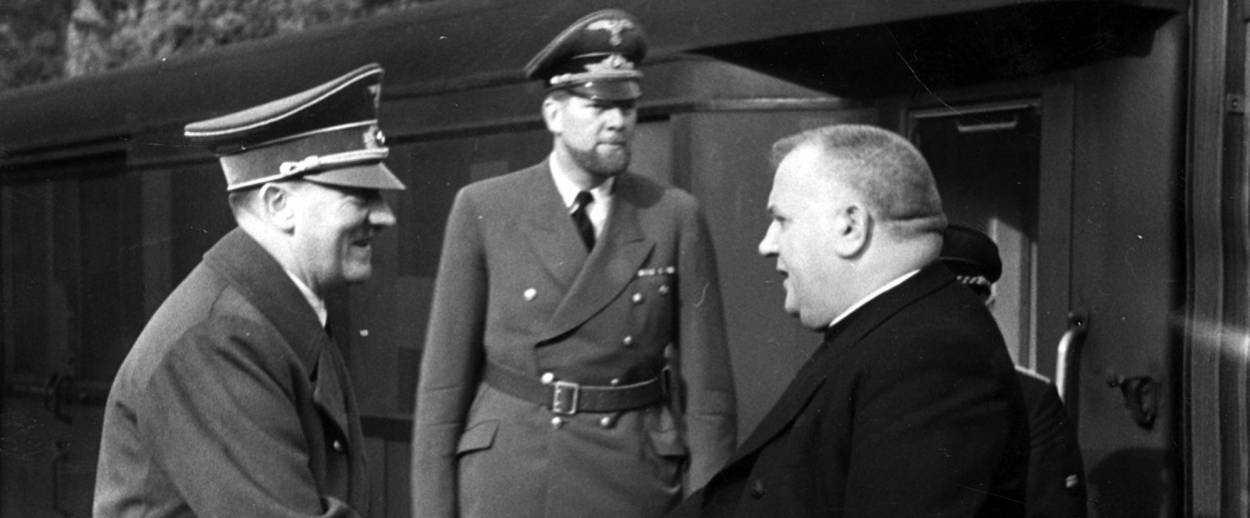The Worst Choice for ‘Greatest Slovak’
Slovakian state TV’s nomination of Hitler ally and WWII era dictator, Jozef Tiso, as ‘Greatest Slovak’ is worrying evidence of the country’s far-right drift




The BBC miniseries and opinion poll Great Britons (2002) is one of the success stories of British television, with spinoffs all around the world—most recently in Slovakia. In the U.K., the title was earned by Winston Churchill; in Germany, the former Chancellor Konrad Adenauer was named “our best,” and in the U.S. version, produced by Discovery Channel, President Ronald Reagan topped the list.
Unfortunately, Slovakia’s iteration of the show, launched on Nov. 1 by the country’s public broadcasting corporation, the RTVS, has acquired a bitter anti-Semitic flavor. The television channel advertised Jozef Tiso (1887-1947), president of the wartime Slovak State, as one of the contenders for the title of the “Greatest Slovak.”
To be sure, it is often a mistake to judge past historical figures by standards of the present, with Churchill being a prime example. But the case of Tiso is not a difficult one. A Catholic priest-turned-nationalist-politician, Tiso advocated Slovakia’s secession from Czechoslovakia just as Adolf Hitler was turning up the heat in the Sudetenland. When Nazis annexed the Czech part of the country and turned it into a ‘protectorate’, Tiso became the president of a one-party client state of the German Reich, which then acted as its reliable ally throughout the duration of the war.
Most significantly, Tiso was responsible for the deportations of Slovak Jews to German-occupied Poland, which started in 1942. Out of the 58,000 people deported in the first wave (mostly young, unmarried women), only 282 returned. Overall, at least 70,000 Slovak Jews perished in the Holocaust, out of an initial population of around 89,000.
At a time when some in Central Europe are seeking to minimize the involvement of local populations in the Holocaust, it bears stressing that the deportations from Slovakia were not a German imposition but resulted from the initiative of Slovakia’s government–and were, in fact, stopped in 1943 after considerable international pressure, including from the Holy See. The Slovak government also reimbursed Berlin 500 Reichsmark for each deported person (around $200, expressed in 1940 U.S. dollars). President Tiso, who was arrested after the war and sentenced to death in 1947 for treason, war crimes, and crimes against humanity, was not timid about his motives:
“I am asking: Is it Christian that the Slovak nation is seeking to get rid of its eternal enemy, the Jew? Is it Christian? The love of self is God’s imperative. That love urges me to purify myself of everything that harms me and threatens my life. And I believe nobody needs convincing that the Jewish element has threatened Slovak life.”
Following public outrage, RTVS decided to exclude Tiso from the poll and to withdraw the promotional materials about him. The show is now also being investigated by the country’s National Criminal Agency for instigating extremism. Yet, the initial inclusion of the wartime politician and the prominence given to Tiso by the show’s producers, are not a fluke but part of a larger and worrying project of Slovakia’s nationalists.
The country is currently governed by an eclectic, mostly pro-Western, and fragile coalition of the populist center-left Smer Party; a small center-right Hungarian party, Most-Híd; and of the Slovak National Party (SNS), led by the ambitious speaker of Slovak Parliament Andrej Danko. A nominee of SNS, Jaroslav Rezník, was elected last year as the new head of RTVS, heralding a politicization of public broadcasting. Many of RTVS’ leading journalists resigned in protest and the new leadership has been since tightening control over RTVS’ news and other content.
Rezník was elected to his current role with the help of votes of the openly neo-Nazi Kotleba Party. Previously, he served as the head of Slovakia public radio during the years of the authoritarian Prime Minister Vladimír Mečiar. Later, as head of the country’s public-service news agency, TASR, he concluded a content-sharing agreement with Russia’s Sputnik. His political backers in SNS are vocal about their ambitions to remodel Slovakia’s government in the image of Viktor Orbán’s Hungary, through “a tough centralization of power,” as Danko (himself a frequent guest of Putin’s regime) put it.
In Orbán’s Hungary, the process of sanitizing the nation’s wartime history and its complicity in the Holocaust, undertaken under the government’s auspices by the revisionist historian Mária Schmidt, has been integral to the regime’s narrative about the special role of the Hungarian nation in history. It is not surprising that SNS is deploying the same technique in a country which, too, has a long history of casual anti-Semitism extending back to the era of Romantic nationalism of the 19th century.
The key difference is that in Slovakia such revisionist voices do not yet control all levers of power. Danko’s ambitions might be slowly growing, yet unlike in Orbán’s case, they do not seem to be matched by the ruthless, calculating intellect an aspiring authoritarian needs. Instead, SNS’ leader often attracts ridicule for his gaffes and attempts to add grandeur to his office. As a result, it is much easier for outside actors, including the EU and the United States, to pressure Danko’s coalition partners to make sure he is put in his place. On many subjects, such as his displays of affection for second-tier officials of Putin’s regime, that might not be worth the effort. However, when it comes Danko’s quest to revive the worst demons of Central Europe’s past, being silent is not an option.
Dalibor Rohac is a research fellow at the American Enterprise Institute in Washington DC. Follow him on Twitter at @DaliborRohac.